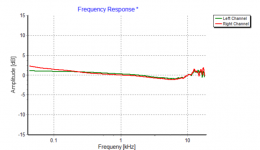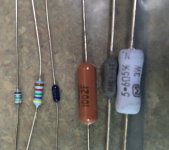You still need to watch out for DC levels on the devices being tested or the transient can be tied to A->B, B->A, etc. regardless of the sound of the actual switches.
You need to watch out for a ton of stuff, including that. ;-)
When I did a setup back then, I did some test runs, one silent, one with a simple test tone, and some with music, and listen for differences with the signal paths being representative but identical. If I hear any differences, the setup is disqualified and the must be repaired.
These days I bring along a younger person with hearing that I trust on the grounds of sensitivity and listener training, as I don't trust these 68 year old ears, and haven't for quite a while.
I know of at least one well known self-proclaimed golden ear who is about my age, and all I have to say is "Oh, oh, oh!"
Last edited:
.......... This isn't the dressmaking forum.
Really? And I thought it was about 'sound tailoring' - silly me!

If your attempts to identify the devices under test turn out to be random guessing, what can you say for yourself?
you tell me that without your dbx you cannot know if I hear the sound of resistor ?
You need to watch out for a ton of stuff, including that. ;-)
That's for sure, you only need a few folks to game the system and it causes decades of pollution.
you tell me that without your dbx you cannot know if I hear the sound of resistor ?
A dbx will definitely reduce noise.
you tell me that without your dbx you cannot know if I hear the sound of resistor ?
Not at all.
There are often many roads to truth, ABX done right is just one of them.
However, sighted evaluations of something like resistor sound are highly likely to be flawed.
Y;-)
...................
These days I bring along a younger person with hearing that I trust on the grounds of sensitivity and listener training, as I don't trust these 68 year old ears, and haven't for quite a while.
I know of at least one well known self-proclaimed golden ear who is about my age, and all I have to say is "Oh, oh, oh!"
Many older people have very unrealistic beliefs in the efficacy of their hearing functions. Have you noticed that they (we) often have the most to say in social situations as the ageing process advances? The elderly are accused of being inclined to ramble-on. Is this because they so often have such lousy hearing that they evade the difficult task of listening by talking more than they did when their hearing was adequate for purpose? I do believe that those over, say 40, (being generous) are honour bound to furnish the results of a recent extended audiology test (NOT self administered) before expecting their views to be accepted when they debate the finer nuances of system performance, the matter of cable 'sound', recording quality etc etc.!
Further those who make their money by audio equipment reviewing need to publish their test results in every article they pen! [They also need to publish 'on oath' a statement that they have never shown any favour in return for any form of gratuity.]
However, sighted evaluations of something like resistor sound are highly likely to be flawed.
thanks to tell us a science fact !
like:
I have a older Rega TT, and no way can it compete SQ-wize even with just a Sansa Clip
Old as the Pyramids (literally) bad/dirty logic question.Well in this world there ins't science fact that the sound of resistor cannot hears ?
I'm wrong ?
How can you tell me that I cannot ??
As an example, it carries the same Logic value (none) as: "you can't *prove* there are no UFOs in Pluto"
Nobody can get inside your mind so the experiment remains impossible ... which to *us* is a problem
For Believers, of course, minor matters such as "proof" , "consistency" , "repeatability", etc. are small useless annoyances which can be brushed off.
"Proof enough" is reduced to citing Believer written "magazines" and similar dubious stuff
If anything, it's *you* who must prove your outlandish statements.
As in: "the one who makes extraordinary claims is the one who must provide (extraordinary?) proof"
Here are some resistors. They all work just fine. The big blue one makes the most sound when dropped.
The smallest one is actually .5 watt Vishay BC SFR16 series then a .6 Watt MRS BC and the little dark blue one a CMF. Then we have a nice RN65 Dale, a Reidon 3 Watt 1% and the Panasonic 3 Watt.
The CMF and RN65 are not magnetic I like the concept but don't know if it really matters.
I used Holco resistors once they made my list with almost 100% failure due to noise. When replace with RN60 Dales all was fine.
The smallest one is actually .5 watt Vishay BC SFR16 series then a .6 Watt MRS BC and the little dark blue one a CMF. Then we have a nice RN65 Dale, a Reidon 3 Watt 1% and the Panasonic 3 Watt.
The CMF and RN65 are not magnetic I like the concept but don't know if it really matters.
I used Holco resistors once they made my list with almost 100% failure due to noise. When replace with RN60 Dales all was fine.
Attachments
Here are some resistors. They all work just fine. The big blue one makes the most sound when dropped.
I couldn't get reproducible results with a fingernail scratch, so I just figured I was either doing a poorly controlled test or deaf as a heap of rocks. Didn't think to drop them to elicit a sound! Good call.
Here are some resistors. They all work just fine. The big blue one makes the most sound when dropped.
The smallest one is actually .5 watt Vishay BC SFR16 series then a .6 Watt MRS BC and the little dark blue one a CMF. Then we have a nice RN65 Dale, a Reidon 3 Watt 1% and the Panasonic 3 Watt.
The CMF and RN65 are not magnetic I like the concept but don't know if it really matters.
I used Holco resistors once they made my list with almost 100% failure due to noise. When replace with RN60 Dales all was fine.
If you cut open a circa 1969 discrete op-amp it's full of RN60's in all critical places.
For those unbelievers , anathema on them !!!!! , who claim the heretical belief that "resistors sound no maketh" , here's a few tools which can make them do sound, not 140dB below hearing threshold but clearly heard in an average room, overcoming, say, 60/70dBA background noise:
1) violin bow: the scratchy sound is *clearly* heard, a little rosin increases the effect, and it does not need to be 6 Million years old petrified type, with or without fossilized mosquito inside:
2) for the hard of hearing, nothing beats a good pair of drumsticks.
You can glue the resistors under scientific test to some wood or metal tabletop, to avoid them fly all over the place and in general refuse to cooperate

3) on the opposite side, for those who have Platinum ears, who can hear what nobody else can, we can go the subtle way and use soft tipped vibraphone sticks:
4) for the Classical Music fans (and Jazz, why not?) , we can glue the resistors to piano strings, just where the hammer hits, and play selected melodies to hear the resistor influence.
By the way, this is a very strong weapon against the boring Engineers who claim that "a resistor is a resistor and only resistance matters" , a truckload of Engineers could not differentiate between a 5M resistor and 5 ohms one, same brand, type, dissipation and chemistry of course, even worse performance considering the 1000000:1 difference, or 60dB .
Tsk tsk Engineers, I'm quite dissapointed by your poor performance:

stay tuned
1) violin bow: the scratchy sound is *clearly* heard, a little rosin increases the effect, and it does not need to be 6 Million years old petrified type, with or without fossilized mosquito inside:
An externally hosted image should be here but it was not working when we last tested it.
2) for the hard of hearing, nothing beats a good pair of drumsticks.
You can glue the resistors under scientific test to some wood or metal tabletop, to avoid them fly all over the place and in general refuse to cooperate

3) on the opposite side, for those who have Platinum ears, who can hear what nobody else can, we can go the subtle way and use soft tipped vibraphone sticks:
An externally hosted image should be here but it was not working when we last tested it.
4) for the Classical Music fans (and Jazz, why not?) , we can glue the resistors to piano strings, just where the hammer hits, and play selected melodies to hear the resistor influence.
By the way, this is a very strong weapon against the boring Engineers who claim that "a resistor is a resistor and only resistance matters" , a truckload of Engineers could not differentiate between a 5M resistor and 5 ohms one, same brand, type, dissipation and chemistry of course, even worse performance considering the 1000000:1 difference, or 60dB .
Tsk tsk Engineers, I'm quite dissapointed by your poor performance:

stay tuned
most sound
Mine is so small, only something military and brown can compensate. (RNC)
Attachments
- Status
- Not open for further replies.
- Home
- Member Areas
- The Lounge
- Resistor Sound Quality?


